October
QF hosted an international audience for a conference where family was at the forefront, and one of the UN’s leading figures, while launching new programs focused on cultural heritage and identity – and introducing a new school model.
Social Progress
The Future of Families2024 marked a three-decade milestone in providing support for families worldwide – and Qatar Foundation was the setting for a key international conference aimed at mapping how challenges facing the family can be tackled into the future.
The 30th Anniversary of the International Year of the Family Conference on Family and Contemporary Megatrends, organized by QF’s Doha International Family Institute (DIFI), brought together thousands of experts, policymakers, and thought leaders from around the world to explore four major trends that affect families in Qatar, the region, and globally: technological change, demographic change, migration and urbanization, and climate change.
Held every 10 years, the conference has a pivotal role in developing policies and programs that support and empower families, and speaking at the opening of its latest edition, Her Highness Sheikha Moza bint Nasser, Chairperson of Qatar Foundation, said: “There is no doubt that the problems facing families are similar in all societies, but they differ in character from one country to the next.
“Families from the global North and families from the global South share many concerns. The most prominent are the negative impacts of technology and the issue of preserving mother tongues and cultural identities in an increasingly globalized world.”
2024 marked a three-decade milestone in providing support for families worldwide – and Qatar Foundation was the setting for a key international conference aimed at mapping how challenges facing the family can be tackled into the future.
The 30th Anniversary of the International Year of the Family Conference on Family and Contemporary Megatrends, organized by QF’s Doha International Family Institute (DIFI), brought together thousands of experts, policymakers, and thought leaders from around the world to explore four major trends that affect families in Qatar, the region, and globally: technological change, demographic change, migration and urbanization, and climate change.
Held every 10 years, the conference has a pivotal role in developing policies and programs that support and empower families, and speaking at the opening of its latest edition, Her Highness Sheikha Moza bint Nasser, Chairperson of Qatar Foundation, said: “There is no doubt that the problems facing families are similar in all societies, but they differ in character from one country to the next.
“Families from the global North and families from the global South share many concerns. The most prominent are the negative impacts of technology and the issue of preserving mother tongues and cultural identities in an increasingly globalized world.”




The family is the cornerstone of our societies. If we look at historical societies that endured for centuries…they succeeded because they recognized the importance of family values.
The conference’s partners were:
- The Ministry of Social Development and Family – strategic partner
- The Permanent Committee for Organizing Conferences within the Ministry of Foreign Affairs – executive partner
- QatarDebate – youth partner
The conference was supported by the United Nations Department of Economic and Social Affairs (UNDESA)
Social Progress
Sounding a CallDuring the two days of the conference, topics including protecting families living amid conflict, the global impact of population decline, work-life balance, and how technology shapes family life were all the subject of focus.
And the conference concluded with the Doha Call to Action: a series of recommendations for addressing the crucial issues families face throughout the world.
These included prioritizing family needs and humanitarian support in countries and regions experiencing war and conflict; integrating lessons on family relationships and values, and intergenerational respect, into school curricula; making family policies a cornerstone of social justice; and involving families, children, and youth in family policymaking and program design.
“The closing of the conference is not about resonant words or slogans to highlight achievements, but rather a call to action in which we all participate,” Dr. Sharifa Noman Al-Emadi, Executive Director, DIFI, told the closing ceremony.
“Each of us bears the responsibility to strive for the implementation of the Doha Call to Action, and we will unite in this endeavor – from decision-making positions, United Nations organizations, civil society organizations, thinktanks, universities, and the private sector.”
During the two days of the conference, topics including protecting families living amid conflict, the global impact of population decline, work-life balance, and how technology shapes family life were all the subject of focus.
And the conference concluded with the Doha Call to Action: a series of recommendations for addressing the crucial issues families face throughout the world.
These included prioritizing family needs and humanitarian support in countries and regions experiencing war and conflict; integrating lessons on family relationships and values, and intergenerational respect, into school curricula; making family policies a cornerstone of social justice; and involving families, children, and youth in family policymaking and program design.
“The closing of the conference is not about resonant words or slogans to highlight achievements, but rather a call to action in which we all participate,” Dr. Sharifa Noman Al-Emadi, Executive Director, DIFI, told the closing ceremony.
“Each of us bears the responsibility to strive for the implementation of the Doha Call to Action, and we will unite in this endeavor – from decision-making positions, United Nations organizations, civil society organizations, thinktanks, universities, and the private sector.”




Strengthening the foundations of the family involves respecting community values, the ability to adapt and be flexible, and strengthening the bonds of solidarity among family members.


Sustainability, Social Progress
A Warning for the WorldA stark warning was sounded by one of the United Nations’ leading figures about the prospects of its Sustainable Development Goals (SDGs) being reached, during an October edition of QF’s Education City Speaker Series.
Her Excellency Amina J. Mohammed, Deputy Secretary-General of the United Nations and Chair of the UN Sustainable Development Group – who also spoke at the DIFI-organized conference on the family – explained how progress toward the SDGs has been hampered by deepening inequalities, caused by overlapping crises, geopolitical conflicts, climate challenges, and economic turbulence.
Ahead of Doha hosting the Second World Summit for Social Development 2025, she outlined how only 17 percent of SDGs are on target, and also aired her views on Middle East conflicts, saying: “There is no war that is deserving of the kind of damage and atrocities committed on society – there must be a pathway back to peace.”
Her words came as the war in Gaza reached the one-year mark, with QF’s Sidra Medicine – along with six other hospitals in Qatar – continuing to provide urgent medical care for injured Palestinian children, while an academic at QF’s Hamad Bin Khalifa University (HBKU) published a policy brief for Gaza’s reconstruction and future leadership.
A stark warning was sounded by one of the United Nations’ leading figures about the prospects of its Sustainable Development Goals (SDGs) being reached, during an October edition of QF’s Education City Speaker Series.
Her Excellency Amina J. Mohammed, Deputy Secretary-General of the United Nations and Chair of the UN Sustainable Development Group – who also spoke at the DIFI-organized conference on the family – explained how progress toward the SDGs has been hampered by deepening inequalities, caused by overlapping crises, geopolitical conflicts, climate challenges, and economic turbulence.
Ahead of Doha hosting the Second World Summit for Social Development 2025, she outlined how only 17 percent of SDGs are on target, and also aired her views on Middle East conflicts, saying: “There is no war that is deserving of the kind of damage and atrocities committed on society – there must be a pathway back to peace.”
Her words came as the war in Gaza reached the one-year mark, with QF’s Sidra Medicine – along with six other hospitals in Qatar – continuing to provide urgent medical care for injured Palestinian children, while an academic at QF’s Hamad Bin Khalifa University (HBKU) published a policy brief for Gaza’s reconstruction and future leadership.
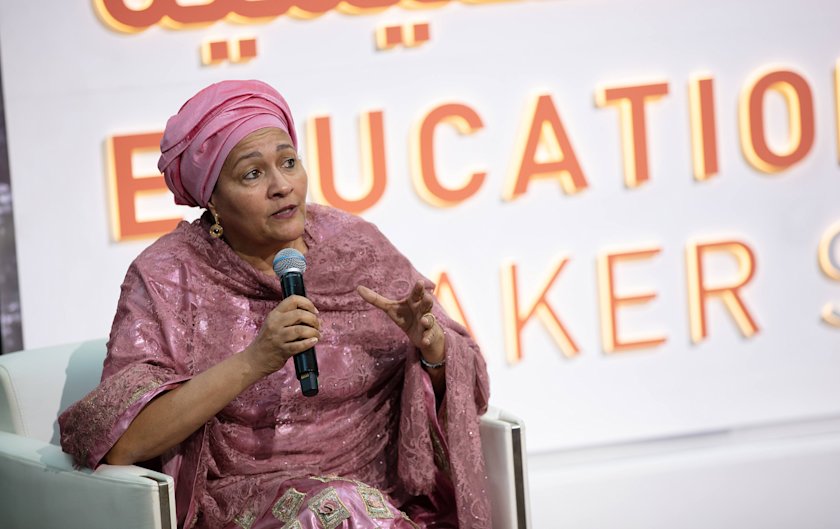
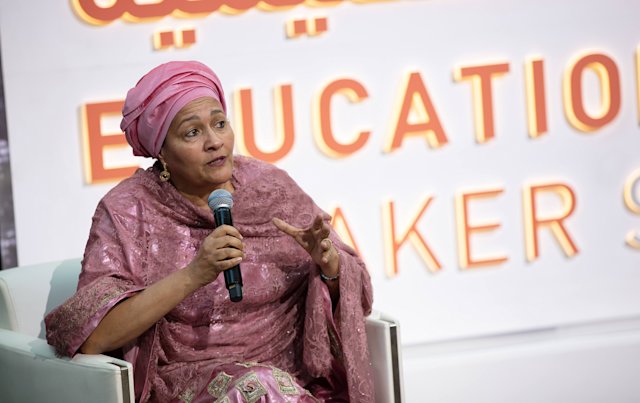
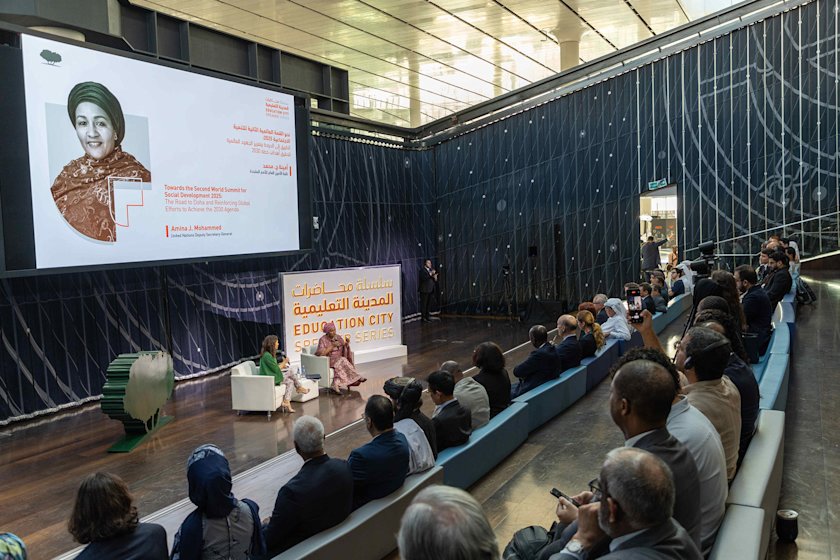
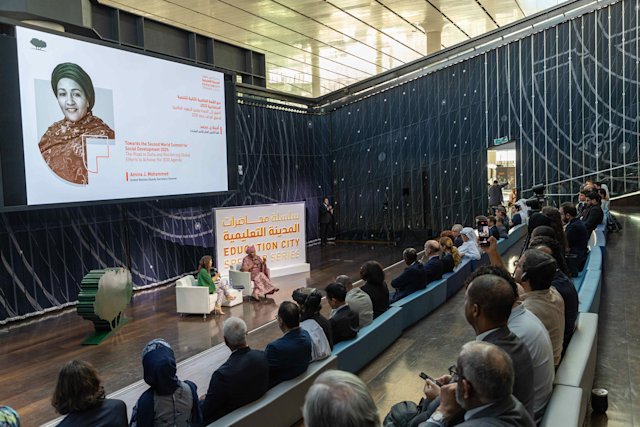
The outlook for achieving people-centered development and meeting the UN’s 2030 Agenda for Sustainable Development is very fragile, but it isn’t too late to change course.
Sustainability
Collaboration Holds the KeyThe need for environmental sustainability on a global scale runs through the UN SDGs – and in October, leaders from government, business, academia, and NGOs gathered in Doha with the aim of shaping Qatar’s approach to climate action.
The fourth edition of the Qatar National Dialogue on Climate Change, organized by the Ministry of Environment and Climate Change alongside QF’s Earthna Center for a Sustainable Future, examined strategies for adaptation and mitigation, with a specific lens being turned on eco-tourism and nature-based solutions, the outcomes of COP28 and the path to COP29, carbon management, and mitigation emissions.
International and cross-sector collaboration in addressing climate challenges was emphasized as key to success, with Dr. Gonzalo Castro de la Mata, Executive Director, Earthna, saying: “The effects of climate change will be felt everywhere, and experts agree that hot and arid countries like Qatar will be most impacted by the effects of rising temperatures.
“It is therefore vital that we all – individuals, businesses, organizations, academia – acknowledge our role in this crisis and take decisive action to secure a sustainable future.”
The need for environmental sustainability on a global scale runs through the UN SDGs – and in October, leaders from government, business, academia, and NGOs gathered in Doha with the aim of shaping Qatar’s approach to climate action.
The fourth edition of the Qatar National Dialogue on Climate Change, organized by the Ministry of Environment and Climate Change alongside QF’s Earthna Center for a Sustainable Future, examined strategies for adaptation and mitigation, with a specific lens being turned on eco-tourism and nature-based solutions, the outcomes of COP28 and the path to COP29, carbon management, and mitigation emissions.
International and cross-sector collaboration in addressing climate challenges was emphasized as key to success, with Dr. Gonzalo Castro de la Mata, Executive Director, Earthna, saying: “The effects of climate change will be felt everywhere, and experts agree that hot and arid countries like Qatar will be most impacted by the effects of rising temperatures.
“It is therefore vital that we all – individuals, businesses, organizations, academia – acknowledge our role in this crisis and take decisive action to secure a sustainable future.”
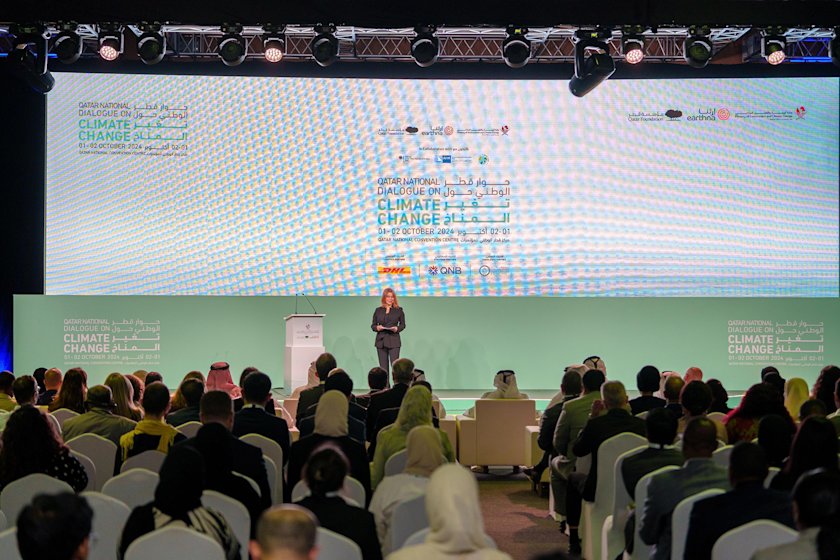
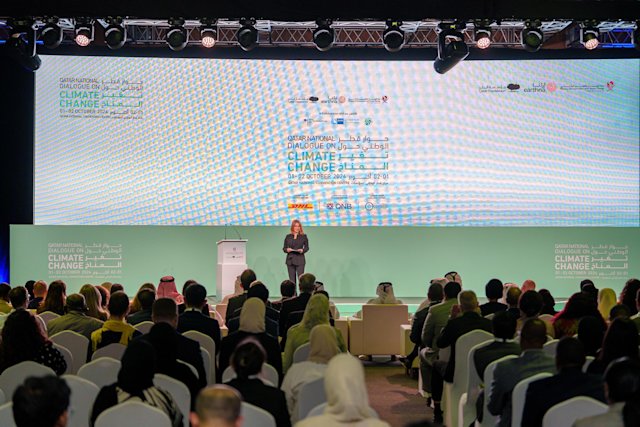
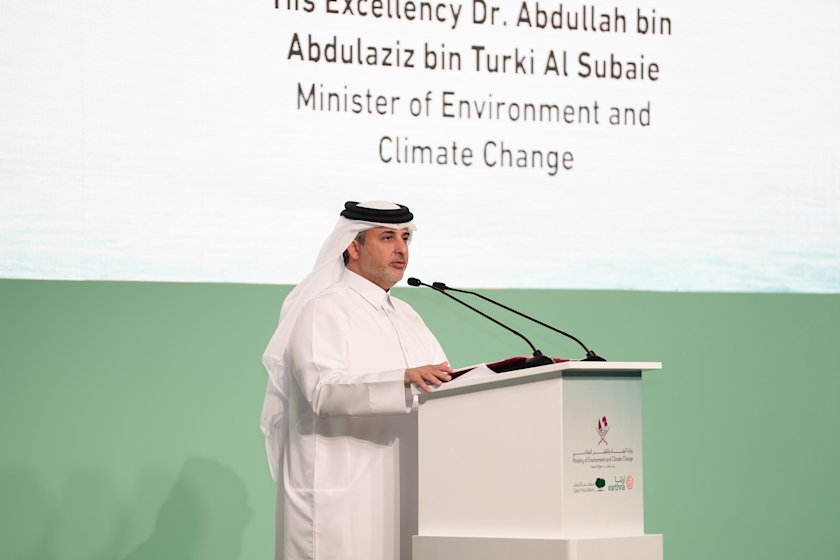
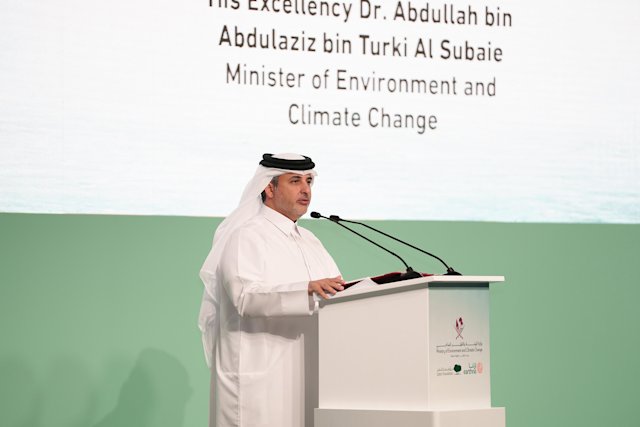
The Qatar National Dialogue on Climate Change saw white papers launched on topics including:
- Climate change innovation
- Artificial Intelligence to combat climate change
- Green and sustainable finance
- Sustainable transport


Social Progress
Immersed in Cultural HeritageSustaining and nourishing the rich heritage of Qatari and Islamic crafts is the purpose of a new program unveiled by QF at a historic house within its Education City home in October.
The Herfah program at Al Khater House is being delivered through a partnership with The King’s Foundation School of Traditional Arts, giving the community of Qatar the opportunity to nurture timeless traditions while also cultivating greater appreciation for heritage and cultural identity. Immersive in design, it runs until June 2025 and offer core courses in traditional crafts such as geometry, nabati ornamentation, and drawing for designers, as well as a series of specializations.
The month also saw QF’s Al-Mujadilah Center and Mosque for Women launch the Ri’aya Young Adult Stewardship Program – an educational and intellectual exchange opportunity for young Muslim women from Qatar and around the world to equip themselves to think critically, analyze contemporary trends, and address challenges to their participation in society.
“By studying Islamic history, contemporary Muslim societies, and global challenges and trends, these young women will be gaining tools to better understand their world context and engage with it in an informed way,” said Dr. Sohaira Siddiqui, Executive Director of Al-Mujadilah.
Sustaining and nourishing the rich heritage of Qatari and Islamic crafts is the purpose of a new program unveiled by QF at a historic house within its Education City home in October.
The Herfah program at Al Khater House is being delivered through a partnership with The King’s Foundation School of Traditional Arts, giving the community of Qatar the opportunity to nurture timeless traditions while also cultivating greater appreciation for heritage and cultural identity. Immersive in design, it runs until June 2025 and offer core courses in traditional crafts such as geometry, nabati ornamentation, and drawing for designers, as well as a series of specializations.
The month also saw QF’s Al-Mujadilah Center and Mosque for Women launch the Ri’aya Young Adult Stewardship Program – an educational and intellectual exchange opportunity for young Muslim women from Qatar and around the world to equip themselves to think critically, analyze contemporary trends, and address challenges to their participation in society.
“By studying Islamic history, contemporary Muslim societies, and global challenges and trends, these young women will be gaining tools to better understand their world context and engage with it in an informed way,” said Dr. Sohaira Siddiqui, Executive Director of Al-Mujadilah.


Participants in the Herfah program at Al Khater House will learn about elements including:
- How geometric principles and language inform traditional crafts
- Constructing patterns and composition
- Observational and analytical drawing
- Transforming raw materials into paint
Elective courses focus on areas such as:
- Traditional Middle East and North Africa painting techniques
- Ceramic skills
- Textiles
- Geometric and biomorphic designs using wood
- Gypsum as a decorative element


Progressive Education
Open for LearningA new model of pre-university education designed to truly take learning beyond the classroom was introduced by QF for the 2024-25 academic year: Education City High School.
Bringing together high school-age students from three QF schools – Qatar Academy Doha, Qatar Academy Sidra, and Qatar Academy for Science and Technology – under one innovative umbrella of learning, Education City High School enables the sharing of resources, new educational pathways, and an open campus ecosystem that broadens student choices and allows their learning experience to be finely tailored to their individual needs.
During October, QF’s Pre-University Education laid out its priorities for the future – including developing cognitive and skills-based programs and new opportunities for gifted students and those with special educational needs – at its annual forum, where several awards were presented to teachers and staff who have displayed exceptional dedication.
And students from QF schools put their talents on display through ‘Creative Currents’, an exhibition demonstrating their abilities in visual arts – from paintings conveying emotions and messages, to artworks and sculptures themed around sustainability and the environment.
A new model of pre-university education designed to truly take learning beyond the classroom was introduced by QF for the 2024-25 academic year: Education City High School.
Bringing together high school-age students from three QF schools – Qatar Academy Doha, Qatar Academy Sidra, and Qatar Academy for Science and Technology – under one innovative umbrella of learning, Education City High School enables the sharing of resources, new educational pathways, and an open campus ecosystem that broadens student choices and allows their learning experience to be finely tailored to their individual needs.
During October, QF’s Pre-University Education laid out its priorities for the future – including developing cognitive and skills-based programs and new opportunities for gifted students and those with special educational needs – at its annual forum, where several awards were presented to teachers and staff who have displayed exceptional dedication.
And students from QF schools put their talents on display through ‘Creative Currents’, an exhibition demonstrating their abilities in visual arts – from paintings conveying emotions and messages, to artworks and sculptures themed around sustainability and the environment.


The open campus principle is built on the belief that learning should not be confined to a single school; instead, students should be immersed in an ecosystem where they can engage with higher education institutions, industry professionals, and cutting-edge research.




Precision Health
A Genomics LandmarkGroundbreaking genomic data was revealed and new research initiatives announced by QF’s Qatar Precision Health Institute (QPHI) in October – as a milestone in QF’s and Qatar’s precision health journey was reached.
QPHI released the largest genomic dataset in Qatar and the region, which will lay the vital foundations for research intended to place the nation at the forefront of genomics. It will make advancements possible in areas including cancer genetics, cardiovascular disease, and mental health, with advanced analytical tools being used to reduce the cost and length of this research.
Meanwhile, Season 16 of Stars of Science – QF’s edutainment TV show that is the region’s leading platform for fostering scientific innovation and entrepreneurship among Arab youth – concluded with Yaman Tayyar from Syria being crowned as the Arab world��’s top innovator.
Tayyar emerged victorious for his ‘Geno’ microfluidic mixer, designed to produce lipid nanoparticles for gene therapy, with Haytham Yahyaoui from Tunisia claiming second place with ‘NeuroVox’, an app that uses AI and machine learning for the early detection of Alzheimer’s disease.
Groundbreaking genomic data was revealed and new research initiatives announced by QF’s Qatar Precision Health Institute (QPHI) in October – as a milestone in QF’s and Qatar’s precision health journey was reached.
QPHI released the largest genomic dataset in Qatar and the region, which will lay the vital foundations for research intended to place the nation at the forefront of genomics. It will make advancements possible in areas including cancer genetics, cardiovascular disease, and mental health, with advanced analytical tools being used to reduce the cost and length of this research.
Meanwhile, Season 16 of Stars of Science – QF’s edutainment TV show that is the region’s leading platform for fostering scientific innovation and entrepreneurship among Arab youth – concluded with Yaman Tayyar from Syria being crowned as the Arab world’s top innovator.
Tayyar emerged victorious for his ‘Geno’ microfluidic mixer, designed to produce lipid nanoparticles for gene therapy, with Haytham Yahyaoui from Tunisia claiming second place with ‘NeuroVox’, an app that uses AI and machine learning for the early detection of Alzheimer’s disease.


This is an opportunity for researchers to work with cutting-edge genomic data and create breakthroughs that can transform patient care.


None of this would have possible without Stars of Science. Their support allowed me to achieve in three months what I thought would take a year.
Progressive Education, Social Progress
Analyzing ArabicCollecting data from Arabic language programs in six countries, a new initiative announced by Qatar Foundation International in October has the goal of providing in-depth analysis of Arabic language instruction, and the impact it makes on students’ lives.
Launched with the Institute of International Education, the Survey of Arabic Language Programs (SALP) Research Project involves examining Arabic teaching methodologies, policy frameworks, program structures, and the demographic contexts in which Arabic is taught. Its aim is to uncover new insights into Arabic language education, and its challenges and opportunities, to help shape future programs, initiatives, and collaborations.
And educational innovations from across the world that focus on digital learning, Braille literacy, using Artificial Intelligence to improve numeracy and automate the learning process for teenagers, supporting literacy in refugee camps, and supporting parents to read with their children were named as finalists for the 2024-25 WISE Prize for Education.
Held by QF’s global education initiative WISE, the initiative – which, in its latest edition, sought projects focused on accelerating literacy, addressing AI challenges, and improving Arabic language teaching – offers finalists 12 months of capacity building and mentorship, with the $1 million WISE Prize for Education being awarded at the 2025 WISE12 Summit.
Collecting data from Arabic language programs in six countries, a new initiative announced by Qatar Foundation International in October has the goal of providing in-depth analysis of Arabic language instruction, and the impact it makes on students’ lives.
Launched with the Institute of International Education, the Survey of Arabic Language Programs (SALP) Research Project involves examining Arabic teaching methodologies, policy frameworks, program structures, and the demographic contexts in which Arabic is taught. Its aim is to uncover new insights into Arabic language education, and its challenges and opportunities, to help shape future programs, initiatives, and collaborations.
And educational innovations from across the world that focus on digital learning, Braille literacy, using Artificial Intelligence to improve numeracy and automate the learning process for teenagers, supporting literacy in refugee camps, and supporting parents to read with their children were named as finalists for the 2024-25 WISE Prize for Education.
Held by QF’s global education initiative WISE, the initiative – which, in its latest edition, sought projects focused on accelerating literacy, addressing AI challenges, and improving Arabic language teaching – offers finalists 12 months of capacity building and mentorship, with the $1 million WISE Prize for Education being awarded at the 2025 WISE12 Summit.
The SALP Research Project is vital for ensuring the sustainability and growth of Arabic education. The insights gained will be vital for implementing evidence-based practices and addressing the needs of Arabic learners and educators in the future.
The SALP Research Project is examining Arabic language programs in:
- Canada
- Ireland
- Italy
- Sweden
- UK
- US
Progressive Education
Setting New RecordsNew high watermarks for engagement were set at two QF partner universities in October – as young diplomats tackled issues ranging from conflict resolution to climate change at the 20th anniversary edition of Georgetown University in Qatar’s (GU-Q) Model United Nations, and Carnegie Mellon University in Qatar hosted its biggest ever Qatar Collegiate Programming Competition, a test of problem solving.
Elsewhere within QF’s education ecosystem, Virginia Commonwealth University School of the Arts in Qatar partnered with the Ministry of Education and Higher Education to announce a new Fine Art Award for Qatar’s high school students; and HEC Paris, Doha launched a bilingual edition of a guidebook that supports entrepreneurs, investors, and policymakers to traverse Qatar’s entrepreneurial landscape.
Academics at GU-Q and HBKU were awarded TradeLab status for a joint pilot clinic which will see students from both universities work alongside policy and business experts to contribute to making international trade fairer and more accessible.
And researchers from HBKU’s College of Science and Engineering secured a top research grant for a project supported by Tokyo’s Waseda University that will study the participation of women in sports in Qatar and Japan, and how this shapes their identities.
New high watermarks for engagement were set at two QF partner universities in October – as young diplomats tackled issues ranging from conflict resolution to climate change at the 20th anniversary edition of Georgetown University in Qatar’s (GU-Q) Model United Nations, and Carnegie Mellon University in Qatar hosted its biggest ever Qatar Collegiate Programming Competition, a test of problem solving.
Elsewhere within QF’s education ecosystem, Virginia Commonwealth University School of the Arts in Qatar partnered with the Ministry of Education and Higher Education to announce a new Fine Art Award for Qatar’s high school students; and HEC Paris, Doha launched a bilingual edition of a guidebook that supports entrepreneurs, investors, and policymakers to traverse Qatar’s entrepreneurial landscape.
Academics at GU-Q and HBKU were awarded TradeLab status for a joint pilot clinic which will see students from both universities work alongside policy and business experts to contribute to making international trade fairer and more accessible.
And researchers from HBKU’s College of Science and Engineering secured a top research grant for a project supported by Tokyo’s Waseda University that will study the participation of women in sports in Qatar and Japan, and how this shapes their identities.




You are at the forefront of work to find new solutions to problems that seem intractable.
Social Progress
The Spectrum of SportsAnd everything a new and diverse season of sporting enjoyment and opportunity at QF’s Education City – which has become a year-round inclusive sports hub for people of all ages – has to offer was showcased in October.
At an Education City event that illustrated how QF is home to a range of sporting choices for individuals and teams, facilities for elite sportspeople, and green spaces for everyone to embrace, a first glimpse was also given of QF’s plans for Qatar’s National Sport Day 2025.
The national celebration of sport and healthy living will see Education City host three main competitions: the Education City Race, with three distances for adults and two for children, the Education City Triathlon, and 15km and 5km Education City Mountain Bike Trail Races.
Sports clubs, fitness classes, and training programs at Education City are all available to the community, alongside courts, halls, and pools; accessible facilities for people with disabilities; paths for walking, running, and cycling; and dedicated spaces for women and girls, including the popular Ladies Nights at the Education City Stadium, where a series of women’s community running races began in late 2024 in collaboration with Qatar Sports for All Federation.
And everything a new and diverse season of sporting enjoyment and opportunity at QF’s Education City – which has become a year-round inclusive sports hub for people of all ages – has to offer was showcased in October.
At an Education City event that illustrated how QF is home to a range of sporting choices for individuals and teams, facilities for elite sportspeople, and green spaces for everyone to embrace, a first glimpse was also given of QF’s plans for Qatar’s National Sport Day 2025.
The national celebration of sport and healthy living will see Education City host three main competitions: the Education City Race, with three distances for adults and two for children, the Education City Triathlon, and 15km and 5km Education City Mountain Bike Trail Races.
Sports clubs, fitness classes, and training programs at Education City are all available to the community, alongside courts, halls, and pools; accessible facilities for people with disabilities; paths for walking, running, and cycling; and dedicated spaces for women and girls, including the popular Ladies Nights at the Education City Stadium, where a series of women’s community running races began in late 2024 in collaboration with Qatar Sports for All Federation.






